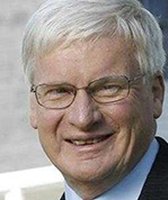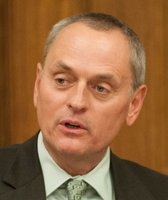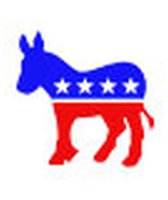Stand up for the facts!
Our only agenda is to publish the truth so you can be an informed participant in democracy.
We need your help.
I would like to contribute

A debate over tax fairness took us inside the books of SC Johnson, the giant consumer products company. Who has the, er, Edge in the dispute?
When a Pulitzer Prize-winning journalist bumped heads with S.C. Johnson, one of the nation’s largest private companies, the collision renewed a tax-fairness debate that flared with reports that General Electric had no U.S. tax bill despite billions in profits last year.
Reuters columnist David Cay Johnston questioned the corporate tax strategies he said allowed the company to avoid paying even one dollar of Wisconsin corporate income tax -- not just for one year, but nine years running.
One focus: A huge annual write-off of interest on a loan the Wisconsin-based company made to itself -- from its small Puerto Rico subsidiary, and later a Delaware subsidiary, to the parent company.
Punching back, S.C. Johnson -- a manufacturing giant in consumer products such as Windex and Ziploc and other popular brands -- denied any illegal or unethical actions. It accused the former New York Times tax reporter of sensational and inaccurate "gotcha" reporting.
In other words, it was Johnston vs. Johnson.
Here at PolitiFact Wisconsin, we can’t fully settle all the scores. But we thought it was worth sorting out fact and fiction in a dust-up that probably couldn’t have happened anywhere but Wisconsin.
Why?
Wisconsin, perhaps alone among the 50 states, makes public the net taxes paid by state-based corporations. Throw in the leak of an internal document that bared a private company’s books and tax actions, and you have a rare how-to lesson in tax shelters.
Here are the highlights of our findings, based on interviews with the reporter, the company and tax experts concerning S.C. Johnson.
First, there is no dispute that the Racine-based company -- ranked by Forbes as a top-30 U.S private company -- has not paid anything in Wisconsin corporate income taxes for many years.
The liberal Institute for Wisconsin’s Future first used publicly available state records to reveal the zero liability from 2000 to 2008. Then the company confirmed it, and told us the streak continued in 2009 and 2010 -- and that it started in 1995.
The tax-free decade-plus in Wisconsin is interesting for several reasons.
First, the company also told us it paid taxes in 16 of the 25 states where it filed returns in 2008, writing checks for about $2 million. Just not in Wisconsin, its home base.
It’s also notable because of S.C. Johnson’s size and profitability. Worldwide, the company has rung up revenue of between $7 billion and $9 billion in recent years, according to estimates by Forbes.
Finally, it’s significant because some of the deductions available to the S.C. Johnsons of the state went away in the last two years as Wisconsin closed loopholes -- but the company still had no liability in 2010.
It’s important to note the company didn’t fail to pay its taxes.
It didn’t pay anything because it didn’t owe anything -- thanks to various deductions and credits, the sort critics say are crucial for business development and critics deride as a tax-avoidance sham.
Let’s dig in and try to answer how common this is, how S.C. Johnson did it and whether it was legal and proper. Along the way, we’ll touch on key statements made in the heat of the Johnston-Johnson exchange.
No tax bill
We found that most very large Wisconsin corporations reporting in-state profit have some income tax bill here. State Department of Revenue records for 2008 and 2004 show that 95% of firms in that situation owe something. A small number get enough in tax credits to reduce their bill to nothing.
But there’s a huge footnote.
For big corporations with operations across the nation, big American profits don’t always translate into taxable profits in Wisconsin.
That can reflect a firms’ sales lagging in Wisconsin compared with other states, or that it has few, if any, in-state customers.
But deductions based on arcane tax law can also play a huge role.
For many years, a big issue was legal shifts of expenses between the home office and out-of-state subsidiaries, an approach that can dramatically lower -- or even eliminate -- the state tax liability. Those and other types of losses can be stockpiled for 15 years and used to reduce taxes even in profitable years. And if that still leaves a taxable income, there are multiple state tax credits to claim at the back end.
How many firms fall into this category -- profitable overall but no tax exposure in Wisconsin?
We know S.C. Johnson does.
They’re not required to disclose it, but they told us the company was profitable each year in the decade starting with 2000. The parent corporation’s U.S. taxable income was $155 million in 2006 (the figure in the leaked document).
Despite that net income nationally in 2006 from the parent corporation, the company’s Wisconsin taxable income was minus-$28 million. That’s right, a big negative number (more on that later).
We could find no studies, private or governmental, looking at how many other firms may fall into this group.
But there is general agreement that it’s not that unusual for big, multi-state Wisconsin corporations to go several years without having a Wisconsin tax liability. We talked to tax and legal experts in the private sector, tax-fairness groups and academics.
Many simply were unprofitable for stretches amid the ups and downs of the last decade. We know that from state data. But, based on what we learned, it’s a very safe bet that some unknown number were profitable but avoided state tax for some time.
One reason we know: Until Wisconsin in 2009 joined other states in outlawing it, multi-state firms -- such as S.C. Johnson -- could limit their Wisconsin tax exposure by shifting money from one state to another. Some termed it the "Las Vegas loophole," referring to the tax haven status of Nevada.
How they did it
In its blistering response to Johnston’s allegations, the company said a well-known state tax credit aimed at keeping big companies here was big enough to wipe out the company’s Wisconsin tax bill.
But the internal documents show the company didn’t use those research and development tax credits in 2006, and the company later confirmed that for us. In fact, SCJ did not claim them at all in the 2000 to 2008 time period Johnston examined, the company has now acknowledged. It says it claimed the credit only in 2010.
Why? We can’t fully know, but it’s clear they didn’t need to use the credits.
So how did the tax bill go away?
In his column, Johnston raised questions about $134 million in deductions he said wiped out the bill. Some involved royalty income the company paid out to its SC Johnson Home Storage subsidiary in Delaware.
But the biggest one saw the company write off $60 million in interest it made on a loan received from its Puerto Rico subsidiary. Later the loan was transferred to a Delaware subsidiary it created.
The deductions effectively moved taxable income outside the state.
The company initially told us the deductions questioned by Johnston weren’t even needed to zero out its tax liability. But we did the math and found the company would have owed almost $400,000 in 2006 without the deductions. The company later confirmed our math.
Is there a legitimate business reason for this kind of internal company loan deal, or was it a tax dodge?
The company says its Puerto Rican operation is not a pass through; it does marketing in the Caribbean and employs 30 people, according to Kelly Semrau, a vice president.
She said it’s sometimes more effective to borrow from subsidiaries that have accumulated funds than to go outside.
The leaked company document listed the loan and other deductions as "potential adjustments to monitor." That means it was flagged as a caution because auditors potentially could raise an issue with it, said Carl Fortner, a Milwaukee tax attorney hired as a consultant to the company after Johnston’s column. The document actually was prepared by a firm that did tax work for the company -- and wanted more work -- using internal data.
In his column, Johnston strongly suggests the possibility of impropriety in the deductions without directly asserting it.
"The...document offers powerful evidence that tax avoidance, not economic substance, enabled the main family business to escape Wisconsin state taxes," Johnston wrote. "Without economic substance, companies can just move symbols around on paper and manufacture unlimited tax deductions."
A former company insider has gone further in questioning the actions.
Michael DeGuelle, the accountant responsible for filing SCJ’s state tax returns for five years, alleged in a federal civil lawsuit that he was punished in part for questioning whether the internal company loans would withstand audit scrutiny.
DeGuelle unsuccessfully filed whistleblower complaints with federal authorities before he was fired in 2009. His lawsuit was dismissed before trial; the judge ruled that some of his allegations didn’t meet the legal test for racketeering, and others were better filed in state court. In June 2011 a Racine County judge ordered him to pay the company, which denies the allegations, nearly $50,000 for defamation. The legal fight continues on appeal.
The company strongly stands by its moves as legitimate.
Said Semrau: "Johnston’s beef should be with the tax code. S.C. Johnson is simply operating within it. Mr. Johnston’s article asserts that these transactions are not legitimate – it’s like saying I’m evading taxes because I put money in my 401(k) or take my mortgage deduction."
Semrau said that the pre-2000 tax bills were zero because of fallout from the commercial real estate bust, which causes losses.
We discussed the propriety of the company’s tax moves with five tax experts with varying viewpoints and allegiances, and none said this category of deductions was illegal or even the least bit unusual.
"These are very commonly used," said Michael Mazerov, a tax expert at the liberal Center on Budget and Policy Priorities who is critical of the practices. "This is state corporate tax planning 101."
"These are not unusual transactions," agreed Margaret Derus, a Milwaukee tax attorney consulting for S.C. Johnson on its response to Johnston’s column.
At the same time, we heard repeatedly that the devil’s in the details: Without an audit by state authorities, it’s impossible to fully evaluate whether abuses occurred.
It’s been a while, in S.C. Johnson’s case.
The company says no state income audit has occurred since before 2000; DeGuelle claims 1991 was the last income tax audit. (Wisconsin officials say, by law, they can’t comment on this.)
For instance, both Derus and Mazerov said that you would need to know the interest rate on the internal company loans to know if they were proper.
State auditors can pursue payments, and those actions can spawn legal challenges.
"Reducing taxes is a perfectly legitimate business goal so long as it is not the primary purpose for a transaction," the Wisconsin Tax Appeals Commission wrote in a 2010 decision siding with the state against business actions by Hormel Foods Corporation the commission said were a "fig leaf" for "tax avoidance."
Bottom line: Only an audit and perhaps legal rulings could resolve the propriety of the company’s actions, but nobody has presented damning details so far.
"SCJ would welcome an audit by the state of Wisconsin," Semrau said.
There’s one more angle to this before we wind down.
It’s the political side.
Twice in the last five years or so, state politicians tightened down on loopholes of the type S.C. Johnson and many other companies have benefited from.
So why has the company continued to have no state income tax bill?
In 2008, during Gov. Jim Doyle’s tenure, the state closed off deductions for interest payments to related entities, in an effort to stop tax-avoidance abuses. But the company continued to take them under one of the exceptions in the law, asserting it was for legitimate business purposes.
Then in 2009, in a major change, Wisconsin went to a "combined reporting" approach aiming to wipe out interest deductions on all internal company transactions -- a deduction that SCJ relied on heavily.
But an earlier tax change was a big boon for large firms with a lot of property here. In just a few years, so-called called "single sales factor apportionment" reduced from 42 percent to 1 percent the share of the company’s total U.S. profits subject to taxation in its home state of Wisconsin.
That, and the revelation that as of 2006 the company had stockpiled both $230 million in losses from earlier years and $16.5 million in research and development credits seem to put the company in good position to hold down its Wisconsin tax bill into the future.
Tax laws, of course, ultimately are political and public policy decisions.
"If the Wisconsin Legislature decides there is benefit in changing the R&D tax credit versus attracting and retaining jobs in the state, S.C. Johnson would of course pay whatever taxes would be assessed," Semrau said soon after Johnston’s column was published.
Jack Norman of the liberal Institute for Wisconsin’s Future had his own legislative prescription.
"The rest of us shouldn’t have to pay extra to make up for taxes not paid by billionaires," said Norman, referring to the wealthy family that controls S.C. Johnson.
Our Sources
Institute for Wisconsin’s Future, "Who does not pay taxes?" August 2011
David Cay Johnston, Reuters column, "Wiping Out Wisconsin Taxes," August 26, 2011
Price Waterhouse Coopers, S.C. Johnson & Son, Inc. State and Local Tax Observations & Considerations, April 18, 2008
Milwaukee Journal Sentinel,"SC Johnson defends its taxpaying record," Aug. 31, 2011
Statement by SC Johnson senior vice president, Aug. 30, 2011
Institute for Wisconsin’s Future,press release responding to SC Johnson statement, Sept. 1, 2011
Interviews with David Cay Johnston, Reuters columnist, September 2011
Interviews with Stephanie Marquis, communications director, Wisconsin Department of Revenue, September 2011
Interviews with Jack Norman, Institute for Wisconsin’s Future, research director, September 2011
Interviews with Margaret Derus, Reinhart Boerner Van Deuren, chair of the firm's Tax Litigation team and practice leader of the State and Local Tax team, September 2011
Interviews with Carl Fortner, Foley & Lardner, member, Taxation Practice team, September 2011
Interviews with Kelly Semrau, S.C. Johnson vice president for global corporate affairs, communication & sustainability, September 2011
Interview with Matthew Gardner, executive director, Institute on Taxation and Economic Policy, Sept. 7, 2011
Interview with Michael DeGuelle, former state tax manager, S.C. Johnson, Sept. 8-9, 2011
Interview with Michael Mazerov, senior fellow, state fiscal project, Center on Budget and Policy Priorities, Sept. 2, 2011
Interview with Richard Pomp, Alva P. Loiselle Professor of Law, University of Connecticut Law School, Sept. 7, 2011
Interview with Rob Reinhardt, program supervisor, Tax Policy section, Wisconsin Legislative Fiscal Bureau, Sept. 6, 2011
PolitiFact Wisconsin, "One Wisconsin Now says two thirds of state corporations don’t pay state income tax," May 11, 2011
Wisconsin Department of Revenue, 2008 Wisconsin C-Corporation Income and Franchise Tax Liability, August 30, 2011
Wisconsin Department of Revenue, 2004 Wisconsin C-Corporation Income and Franchise Tax Liability, August 25, 2006
State of Wisconsin Tax Appeals Commission, Decision and Order, Hormel Foods Corporation vs. Wisconsin Department of Revenue, March 29, 2010
Wisconsin Act 226, Section 96, Related Entity Addbacks, May 16, 2008











































